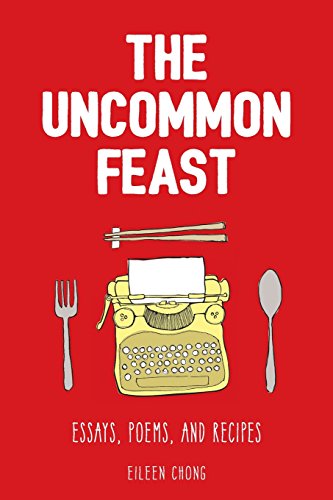Eileen Chong, The Uncommon Feast: Essays, Poems and Recipes (Recent Work Press 2018)
In 2017, Eileen Chong’s third book of poetry, Painting Red Orchids, was shortlisted for the Australian Prime Minister’s Literary Awards. At the awards ceremony, a senior poet told her that many of her poems were like recipes, and if she collected them into a book she might have some success with it. She writes about this comment, and her reaction to it, in the first essay of The Uncommon Feast. ‘I am speechless,’ she says. ‘I feel put in my place, and ashamed.’
Happily, the shame didn’t last. The Uncommon Feast is a beautiful, generous, delightful response to that comment. It contains poems that are like recipes, as well as actual recipes. And it is much richer and more rewarding to culinary and non-culinary readers alike than anything her fellow poet presumably had in mind.
As Judith Beveridge says in her Introduction, the poems are at the heart of the book, but the prose essays and recipes, and the line drawings by Chong’s husband Colin Cassidy, are what transform it from a slim vol of poetry to a feast of a book. ‘The Common Table’, a short essay first published in Meanjin, which includes the account of the awards evening, also gives us the wonderful (food-related) moment when Chong’s mother understood that she was a writer; and ‘Eating and Telling: A Personal Food History’, is a quick autobiography told in terms of food – the school canteens (Singapore’s version so much more interesting than North Queensland’s), family meals, dining with partners, the bliss of cooking and eating with her husband. If we needed instructions on how to read Chong’s food poems, they are there:
Food, for me, is representative of family, culture, nourishment and love. I’ve learned how to cook from my grandmother, my mother, my friends’ mothers, and my partners over the years. The dishes I prepare are a palimpsest of experiences and cultures, new and old.
I’m surrounded by people who say they don’t get poetry – they feel intimidated by it, or see it as lost up its own wazoo. If any one book could convert them to poetry lovers, this would be it. There are many wonderful moments. For example, ‘Chinese Ginseng’ is a very fine poem in which the poet’s mother offers ginseng as a traditional cure for what the daughter knows to be irremediable. It ends:
--------------------------------------There is no point
in telling my mother what she doesn't want to hear:
------polycystic ovaries,
endometriosis, infertility. Instead, I just listen – I can
------almost taste
her soup, sweet dates and wolfberries, smoky angelica
------and lilybulb,
but above all, the unmistakeable bitter-sweetness of
------Chinese ginseng.
Such a great moment! Ginseng may not be a cure for the physical ailment, but it becomes a sacrament of the mother’s love. Facing the poem is Colin Cassidy’s drawing of a ginseng root, inscribed with the words ‘panacea, tonic, necessity’ Then you turn the page to a recipe for Chinese Ginseng Chicken Soup, and you’re invited to join the moment with your own soup-making, soup drinking body.
The book is full of segues, and juxtapositions like that. I laughed out loud a number of times for sheer joy.
The Uncommon Feast is the third book I’ve read for the 2019 Australian Women Writers Challenge.




As one of your poet-sceptic followers, I was trying to be persuaded … then I saw she’s used the word ‘palimpsest’. If ever a more unpoetic word existed, I haven’t heard it!
LikeLike
Ah but that wasn’t in a poem! And anyway what’s unpoetic about palimpsest?
LikeLike
ha ha! I thought you would say that. But she’s a poet, and shouldn’t use such ugly words!
LikeLike
I will rebut you soundly tomorrow. But I have to get up early for grandparent duty …
LikeLiked by 1 person
I couldn’t sleep, so here is my response:
Should ‘palimpsest’ be judged unworthy
comrade to the words that sing?
Abstract? Ugly but not earthy?
Word least likely to take wing?
Suited only for dry scholars,
hermeneuts with starchy collars?
No! Scratch its surface, find what’s hidden
in what seems a simple past,
long shadows by each moment cast.
Every sentence is a midden,
each image a treasure chest.
I swoon when I think, ‘palimpsest’.
And now to bed.
LikeLiked by 1 person
I’ve never read a better explanation for that delicious word! You rose to the challenge most admirably!
LikeLike
Well done Jonathan! I like your explanation much, much more than I like the word!
LikeLiked by 1 person
The weird thing is that it’s a word I’ve always loved!
LikeLike
Oops. Sorry to dis a word you love. I see it as one of those overly complex terms that shut people out. Plus it doesn’t flow. But one person’s poisson …
LikeLike
Pingback: Poetry & General Non-Fiction Round Up | Australian Women Writers Challenge Blog